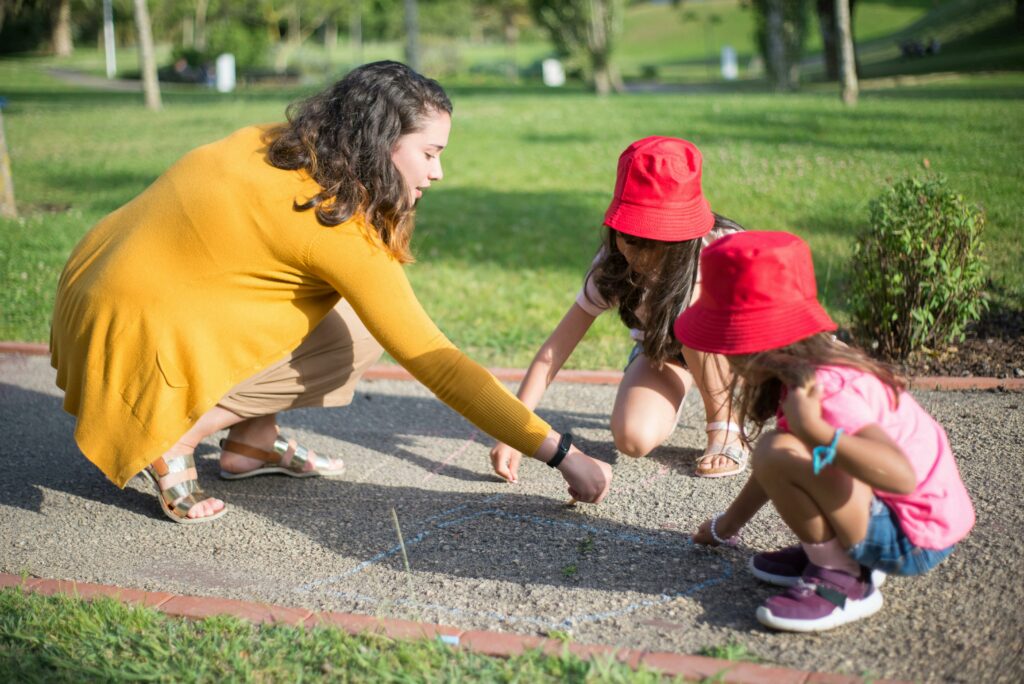In today’s fast-paced world, finding the right childcare solution is more crucial than ever for families juggling work, education, and personal commitments. As parents strive to provide the best upbringing for their children, the choice between hiring an au pair and a nanny becomes a significant decision. Each option offers unique benefits and caters to different family needs, making it essential to understand the key differences between the two. This article aims to delve into the distinctions between au pairs and nannies, focusing on aspects such as missions, allowances, age, educational experiences for the kids, and overall costs. By comparing these roles, we hope to offer valuable insights to families considering these childcare options, ensuring they make an informed decision that best suits their lifestyle and their children’s developmental needs.
The Conceptual Differences between au pair and nanny
Before diving into the specifics, it’s essential to grasp the fundamental differences between an au pair and a nanny. Both roles are centered around childcare but hail from distinct origins and embody different missions within a family setting.
- Definition and Origin: An au pair is typically a young individual from another country who lives with a host family, offering childcare in exchange for the opportunity to learn a new language and experience a different culture. The term “au pair” is French for “on par” or “equal,” highlighting the intended relationship of mutual respect and cultural exchange between the au pair and the host family. In contrast, a nanny is usually a local, more experienced childcare professional hired to provide consistent care and education to children in their own home.
- Mission Differences: The mission of an au pair extends beyond mere childcare; it encompasses cultural exchange and mutual learning. Au pairs are expected to become a part of the host family, sharing their own culture while absorbing the family’s traditions and values. Au pairs are between 18 and 30 years old, and their age helps to bridge the gap between parents and children, making it easier for the 2 generations to understand each other. Nannies, however, have a more defined role focused on providing high-quality childcare, educational activities, and sometimes additional household management tasks. Their professional relationship with the family is more employment-based, with clear boundaries and expectations.
Understanding these conceptual differences is crucial for families to align their expectations with the realities of each childcare option. Whether seeking a cultural ambassador for their children or a seasoned childcare professional, knowing what each role entails is the first step in making an informed decision.
Age and Experience
The age and experience of the childcare provider are crucial factors that differentiate an au pair from a nanny. These elements not only influence the dynamics within the household but also the type of care and learning opportunities provided to the children.
- Typical Age Range: Au pairs are generally young adults, often between 18 and 30 years old. This age group is specifically chosen to encourage a vibrant cultural exchange and to provide the au pair with an opportunity for personal growth and international experience. In contrast, nannies can span a broader age range, with many bringing years or even decades of childcare experience to their roles. This experience often translates into a deeper understanding of child development stages and more refined caregiving skills.
- Educational Background and Childcare Experience: Au pairs might not always have formal training in childcare or education, although many come with babysitting experience or have taken courses related to child development. Their primary qualification lies in their enthusiasm to engage in cultural exchange and their commitment to being part of a host family. Nannies, on the other hand, often possess qualifications in early childhood education, psychology, or related fields. Many have extensive experience working in professional childcare settings, making them well-versed in educational methodologies and child psychology.
The choice between an au pair and a nanny may hinge on the family’s preferences for either a cultural and language exchange experience, and young and fun relationship or a more structured, education-focused childcare approach. Both options present unique benefits and opportunities for children’s growth, be it through informal cultural learning or formal educational activities.

The Allowance and Cost Factor
When considering childcare options, the financial implications play a pivotal role in the decision-making process for many families. Understanding the differences in allowances, salaries, and overall costs between an au pair and a nanny is essential.
- Overview of Financial Aspects: Au pairs are not considered employees but rather participants in a cultural exchange program. As such, they receive a weekly allowance or “pocket money” rather than a salary. This allowance is often significantly lower than the wages paid to nannies, reflecting the au pair’s living situation within the host family’s home and their participation in family life. In many countries, the specific amount is regulated to ensure it covers the au pair’s personal expenses without equating to a professional wage.
- Comparative Analysis of Overall Cost: The cost of hosting an au pair includes not only the weekly allowance but also the provision of room and board, and sometimes contributions to language courses or travel expenses. Despite these additional costs, hosting an au pair often remains more affordable than hiring a nanny, especially when considering the latter’s professional salary, potential benefits, and taxes that employers might need to cover. However, the true value of an au pair or nanny cannot be measured purely in financial terms but should also consider the qualitative benefits each brings to a family’s life.
The financial aspect of choosing between an au pair and a nanny involves balancing the upfront costs with the long-term benefits. While au pairs offer a cost-effective solution with the added value of cultural exchange, nannies provide professional childcare services that might justify their higher expense for some families.
Educational Benefits for Children
One of the most significant factors for families when choosing between an au pair and a nanny is the potential educational benefits for their children. Both options can offer unique learning opportunities, but they differ in approach and outcomes.
- Unique Educational and Cultural Experiences with Au Pairs: Au pairs bring a slice of their culture, language, and traditions into the host family’s home, offering children a firsthand international experience. This exposure to a new language and culture can significantly enhance a child’s cognitive development and cultural awareness. Activities with an au pair often include learning new words in a foreign language, exploring international cuisines, celebrating different cultural traditions, and having fun with a big brother and sister all of which contribute to a well-rounded global education.
- Professional Childcare Training with Nannies: Nannies with a background in early childhood education or related fields can provide a more structured learning environment. They are equipped to design educational activities that align with developmental milestones, helping children achieve academic readiness and social competence. Their professional training enables them to address various learning styles and challenges, ensuring that the educational needs of each child are met in a supportive and enriching manner.
- Impact on Children’s Affective and Psychological Balance: Both au pairs and nannies can play a pivotal role in supporting the emotional and psychological development of children. Au pairs, through their close bond, small age gap and cultural exchange, can enhance children’s empathy, adaptability, and openness to new experiences. Nannies, with their expertise in child development, can provide a stable and nurturing environment that fosters emotional security and resilience.
The choice between an au pair and a nanny ultimately depends on the family’s priorities for their children’s education and development. Whether through cultural immersion with an au pair or structured learning with a nanny, both paths offer valuable benefits that can shape children’s futures in meaningful ways.

Legal and Contractual Considerations
When welcoming a new member into your family to care for your children, understanding the legal and contractual obligations is essential. The differences between hosting an au pair and hiring a nanny extend into the realm of legal requirements, visas, and employment contracts.
- Visa Requirements and Work Permits for Au Pairs: Au pairs typically come from another country, which means they require appropriate visas and work permits. The specific requirements vary by country, but generally, au pairs participate in cultural exchange programs that facilitate the visa process. Families need to be aware of the regulations in their country and provide support to the au pair in obtaining the necessary documentation. This process often involves proving the cultural exchange nature of the au pair’s stay, which includes language learning and sharing of cultural experiences.
- Employment Laws Applicable to Nannies: Unlike au pairs, nannies are considered employees. This distinction means that families must comply with local employment laws, including minimum wage, working hours, taxes, and social security contributions. Drafting a formal employment contract that outlines the nanny’s duties, hours, salary, and benefits is crucial. This contract provides clarity and protection for both the nanny and the family, ensuring a professional and respectful working relationship.
- Insurance and Liability: Families should also consider liability insurance when employing a nanny or hosting an au pair. This insurance can cover potential accidents or injuries that occur while the childcare provider is performing their duties. Ensuring adequate coverage is part of the family’s responsibility to provide a safe working environment.
- Cultural Exchange Program Regulations for Au Pairs: Families hosting au pairs should familiarize themselves with the regulations of the cultural exchange program through which the au pair is coming. These programs often have specific requirements regarding the au pair’s duties, working hours, and educational opportunities. Compliance with these regulations ensures a successful and enriching experience for both the au pair and the host family.
Understanding these legal and contractual considerations is essential for families to create a supportive, respectful, and legally compliant childcare arrangement. Whether opting for the enriching cultural exchange of an au pair or the professional care of a nanny, navigating these legal aspects carefully lays the foundation for a positive and fruitful relationship.
Choosing between an au pair and a nanny is a decision that goes beyond mere childcare. It’s about deciding what kind of growth, experiences, and values you want to impart to your children. An au pair offers a unique cultural exchange that enriches a child’s worldview and language skills, wrapped in a package of warm familial integration. On the other hand, a nanny provides professional, educational childcare, often backed by years of experience and formal training in child development. Both options present distinct advantages and potential impacts on your family’s daily life and your children’s future.
As families navigate these choices, it’s crucial to consider not just the financial implications but also the long-term benefits to your children’s emotional, psychological, and educational development. Whether you lean towards the cultural immersion and personal growth offered by an au pair or the structured, educational focus of a nanny, the right decision aligns with your family’s unique needs, values, and aspirations.
For families exploring these childcare options, BUTRFLY is here to assist. Our platform connects families with a curated selection of au pairs, ensuring a perfect match that meets your specific requirements. With BUTRFLY, finding the right childcare solution becomes a journey of discovery, leading to enriching experiences for both your family and your chosen caregiver.
Choosing the right childcare is a significant step in your family’s journey. Whether you opt for an au pair or a nanny, the goal remains the same: to provide your children with a nurturing environment that promotes their growth and happiness. With informed consideration and the right support, you can make a choice that beautifully complements your family’s life and your children’s future.
In addition to being the leading au pair program in France, Butrfly’s expertise is recognized by its mission to “help its community grow through self-discovery and discovery of the world” and by the quality of its services. Butrfly, a simpler everyday life, a richer life, a more open world. Discover our website.




